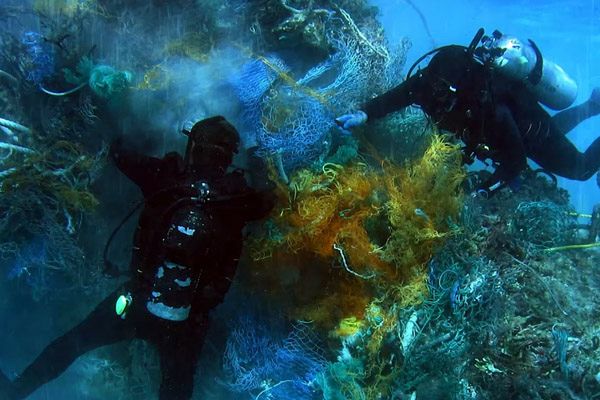Abandoned fishing gear and apparatus is having an extremely detrimental effect on the world's oceans and marine life, writes Syeda Nabiha Wadood.
NEARLY 71% of the surface of the Earth is draped by oceans that constitute the world’s largest ecosystem, accounting for 97% of its water and 70% of its oxygen. Besides regulating temperature by absorption and movement of waves, they harbour the greatest carbon sink on the planet, sequestering 93% of its CO2.
And in return for this global climate control system that in addition to breathing life, provides navigation, recreation, nutriment and employment to us inter alia, human beings dump more than 8 million tons of plastic each year into it, which make up 80% of all marine debris. Researchers predict this global scourge, if allowed to persist at the same pace, will culminate in there being more plastic in our ocean than fish in weight by 2050.
Plastics constitute semi-synthetic/synthetic polymers that are non-biodegradable and instead fragment into microplastics that bioaccumulate toxins and seep into every living thing in the ocean as an imperishable menace. We have already lost 90% of the large fish at the apex of the aquatic food web that play a substantial role in fertilising phytoplankton, which are not only prey to larger animals but also absorb four times the amount of CO2 relative to the mighty Amazon rainforest. By 2050, 90% of corals are expected to be imperilled and some 700 marine species are at the brink of extinction due to our callous disregard for our elixir of life.
Though there has recently been some palpable public cognisance regarding this catastrophic destruction, leading to the three Rs of waste management – reduce, reuse and recycle – gaining popularity and environmental groups even advocating for banning single-use plastics, the single most deadly threat to marine life is predominantly left neglected.
“Ghost gear” that comprises accidentally or intentionally lost or discarded fishing apparatus represents 10% of plastic litter but forms as much as 70% of macroplastics devastating our pelagic habitat. Of the plastic in the Great Pacific garbage patch, 46% is abandoned fishing nets and the mass bulk of the rest is composed of other types of fishing gear. Around 70% of marine animal entanglements can be blamed to this apparition, which has also single-handedly caused a 30% decline in some fish populations.
Whilst there is a visible, much-coveted handwringing regarding plastic straws and little drops make the mighty ocean, and any efforts that upsurge prospects for marine recovery should be encouraged, they only account for 0.03% of the plastic littering the ocean and ultimately 91% of plastic waste never gets recycled despite our endeavours. We, therefore, cannot let it distract us from tackling the most perilous culprit silently choking the life out of our oceans in the shape of ghost gear.
Despite the fact that marine plastic pollution is indisputably illegal in international law, very few states abide by these grave moral and legal obligations. Offenders could, for instance, be taken to the International Court of Justice or the International Tribunal of the Law of the Sea in principle. But because, for most conventions and treaties, only states can bring forth a case against other states, this right is seldom exercised by virtue of the principles of dominance and reciprocity. Furthermore, the current system lacks legal framework, specifically targeting ghost gear, that can be used to ensure compliance and accountability.
Since this is a fundamental global threat to our collective wildlife, it requires harmonised action in the form of a specific, legally binding, solemn U.N. treaty encompassing all nations to address it. Non-state elements should then be authorised to haul offending states before the court, harnessing an effective monitoring, liability and compensation mechanism. At present, ghost gear is more prevalent from illegal and unreported fishing and less than 1% of our oceans are being regulated. Robust regulation and political will employing the U.N.’s special forces for enforcement is imperative to prosecute offenders, apply penalties and sanctuarise large portions of the ocean.
Governments should also coordinate to prioritise removing lethal fishing gear already wreaking havoc on our marine ecosystem. There stands an indispensable necessity to replicate the success of the Montreal Protocol and set out mandatory targets paving the way for the revitalisation and resuscitation of this oceanic womb that encapsulates 80% of all biodiversity in a delicate balance that sustains life on this planet.
Syeda Nabiha Wadood is a global politics and international law enthusiast, currently studying Biomedicine at York, Toronto.
Related Articles
 This work is licensed under a Creative Commons Attribution-NonCommercial-NoDerivs 3.0 Australia License
This work is licensed under a Creative Commons Attribution-NonCommercial-NoDerivs 3.0 Australia License
Support independent journalism Subscribe to IA.












